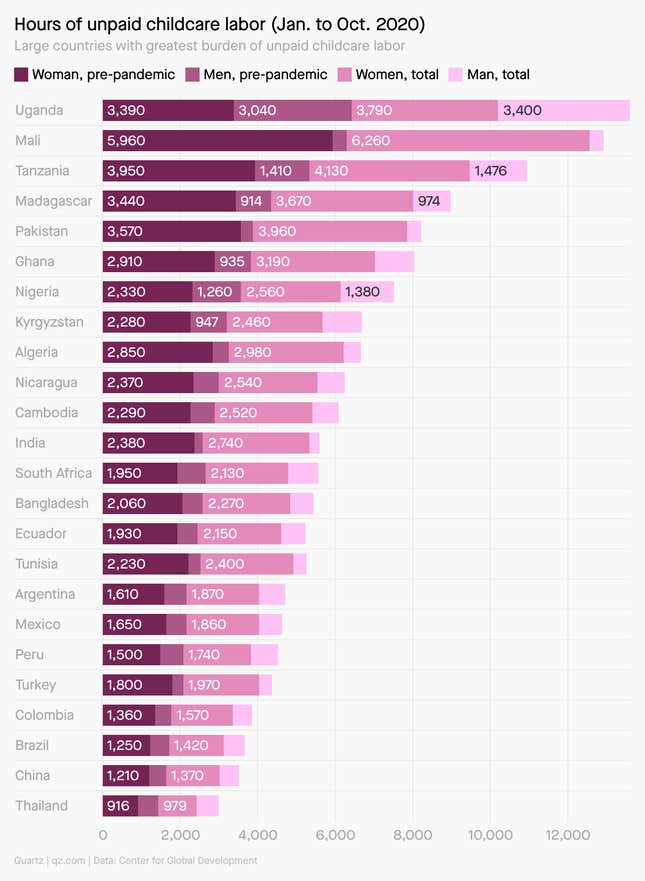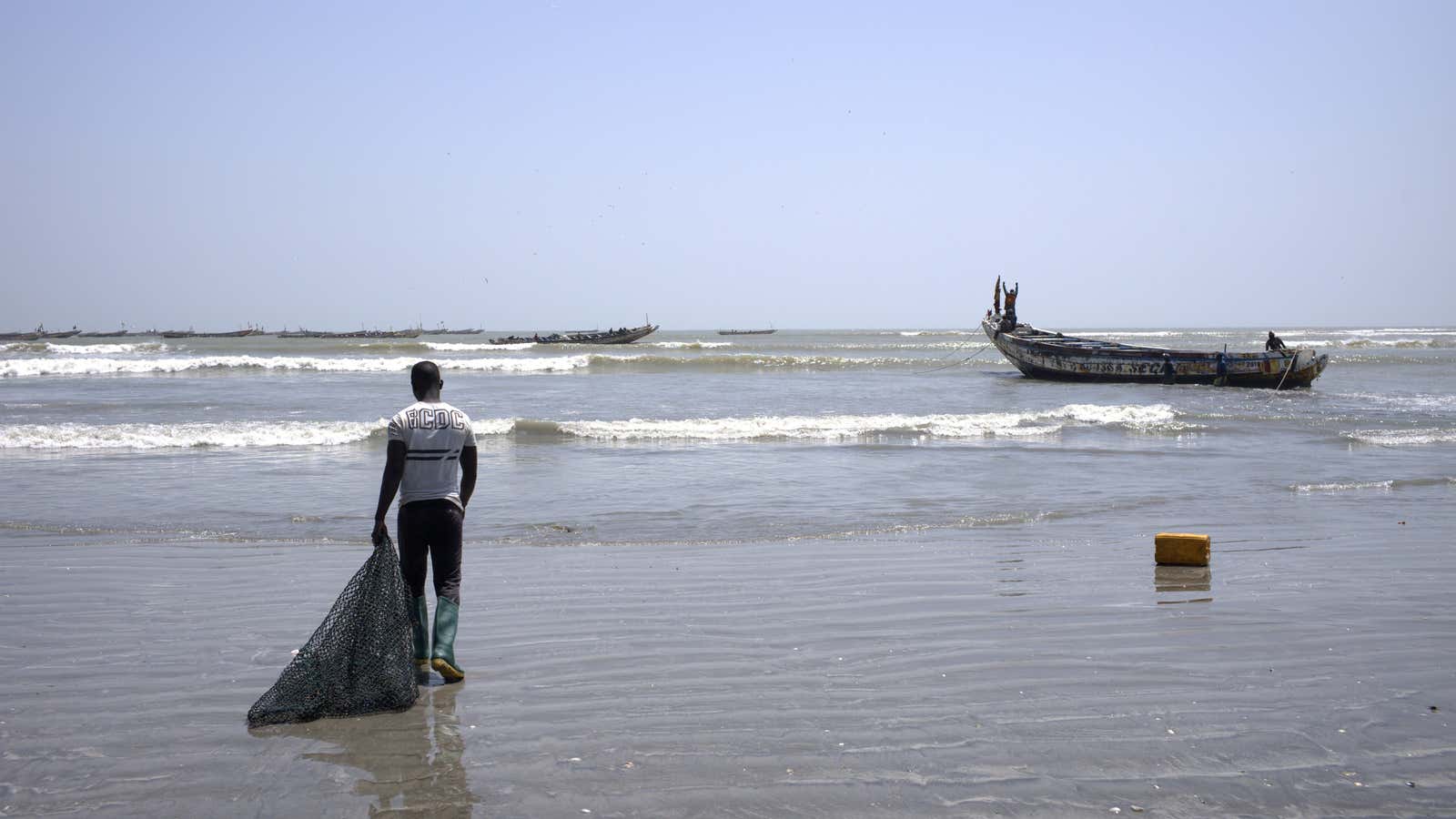Hi Quartz Africa readers!
Omar Sy, the star of the hit crime show Lupin, is touching base with his Senegalese roots for his next big flick.
The 43-year-old actor will play the lead in Father & Soldier, an action drama centered on African soldiers who fought for France during World War I. Sy will play Bakary, a Senegalese man who enlists in the war because Thierno, his 17-year-old son, was forced to fight for France in the war. The characters are fictional, but Bakary and Thierno will be channeling the lives of real-life Senegalese soldiers, known as tirailleurs.
Tirailleurs were recruited from west and north Africa to fight for France in wars. While Father & Soldier explores events taking place in 1917, the film may help draw more attention to the events of December 1944, when the French Army killed hundreds of colonial troops at a demobilization camp outside Dakar in Senegal. Their crime? Demanding to be paid their earned fair wages, which were, in any case, less than half that of their white French counterparts.
France has mostly been silent about that tragedy, and theatrical attempts to keep the memory alive, notably Ousmane Sembène’s Camp de Thiaroye, have been suppressed. This time might be different: Sy, whose company is co-producing Father & Son, said he has the “unwavering support” of France Télévisions, the state-run public broadcaster, and that of Canal Plus, the country’s biggest private broadcaster. Filming will be done in France and Senegal.
When the film comes out in 2023, all eyes will be on Sy—the son of a Mauritanian mother and Senegalese father—to see how he carries the weight of history. This new film is a welcome addition to Africans telling their own stories. —Alexander Onukwue, west Africa correspondent
Stories this week
Nigeria’s eNaira flops in its debut. Nigerian leaders had high hopes for its central bank digital currency when it was unveiled Oct. 25 after a three-week delay. But a flood of bad user reviews kicked the eNaira wallet off Google’s Play store, in what Alexander Onukwue says is an embarrassing first week for the central bank’s innovation bet.
A fintech deal bets on an agent banking boom. Banks are the institutions that come to mind when one thinks of a place to deposit and withdraw money, but corner shop agents are increasingly playing that role in Nigeria. Alexander Onukwue reports on the acquisition of Capricorn Digital, one company with a large agent network in Nigeria, by a South African fintech company.
A health tech startup is digitizing pharmaceutical supplies. Carlos Mureithi profiles Field Intelligence, a health tech startup that manages forecasting, quality assurance, fulfillment, and inventory management for pharmacies in Kenya and Nigeria through a subscription service.
Africa’s covid stats are missing. According to official statistics, only about 8.5 million cases of covid-19 have been reported in African countries since the beginning of the outbreak, just a fraction of the total number. Annalisa Merelli reports on how limited healthcare resources are resulting in fewer than 15% of cases in African countries being reported.
Meanwhile, sub-Saharan Africa is expected to lag behind in its covid-19 recovery. Carlos Mureithi breaks down the IMF’s latest regional economic outlook for sub-Saharan Africa, which projects the region’s economy to recover slowest from the covid-19 pandemic due to vaccine rollout challenges.
And a syringe shortage threatens Africa’s vaccination efforts. Although covid-19 vaccine deliveries to Africa are speeding up, a looming scarcity of syringes may set back the continent’s vaccination drive, Carlos Mureithi reports.
Tracking progress on 2015 Paris Agreement pledges
Despite fresh clean tech cash, most countries aren’t making good on their Paris Agreement promises. In fact, The Gambia, though it has one of the world’s smallest carbon footprints, is the only country pulling its weight.
Check out our infographic, which shows how close (well, mostly far away) countries are from meeting their Paris Agreement pledges.
This Sunday, world leaders will meet at COP26, the biggest climate summit since the Paris Agreement. Get on-the-ground insight throughout the conference from Quartz’s Need to Know: COP26 email.
Dealmaker
Zambian startup Union54, which enables software companies to issue debit cards, raised $3 million in a seed round led by Tiger Global. The deal comes two months after Union54 graduated from this summer’s Y Combinator accelerator program, the first Zambian startup to do so. Other investors that got in on this round include Runa Capital, Ace & Company, Todd & Rahul Angel Fund, and Babs Ogundeyi, CEO of Nigerian neobank Kuda.
Autochek, a Nigerian vehicle finance company, raised $13.1 million in a round led by TLcom Capital and 4DX Ventures. It is Autochek’s second funding round in the past year, following its $3.4 million raise in November 2020. The startup has grown through some acquisitions this year, and aims to grow further by partnering with banks and auto dealerships.
South African healthcare marketplace RecoMed raised $1.5 million to scale its service, which allows patients to find and book services with healthcare professionals online. South Africa-focused venture capital firm Vunani Fintech Fund invested $1 million, while the rest was from AAIC, Growth Grid Venture Capital Partners, and Kenya-based Push Ventures.
Charting gig economy flexibility
One of the biggest perks promised by gig economy platforms is flexibility. But some flexible, work-from-home arrangements during the pandemic have proven to be more burdensome for women because of the unpaid childcare labor they’re expected to perform, Caribou Digital researcher Grace Natabaalo finds.

Quartz Gems
🎧 Have you heard that we launched a podcast?
The latest episode of the Quartz Obsession podcast features Quartz Africa editor Ciku Kimeria and executive editor Kira Bindrim bopping to Afrobeats classics (yes, we still have “Mad Over You” on repeat). They discuss how the beat-heavy, electronic music has been gaining a global fan base—and is finally helping local artists make money.
Subscribe to the Quartz Obsession podcast on Spotify, Apple, Google, or wherever you get your podcasts. You can support more grooving episodes like these by becoming a Quartz member and signing up now for a 7-day free trial.
Other things we liked
A fight for software engineers. In 2019, Microsoft announced it was opening engineering hubs in Nairobi and Lagos. For the Financial Times, Antoaneta Roussi writes that local startups are struggling to compete with the American software giant in recruiting and retaining key staff as it aims to fill 500 software engineering jobs.
Africa’s next financial hub. Kigali, Accra, and Nairobi all have aspirations to become key financial centers on the continent. The Economist details what growing an ecosystem like this would require, and why some of the plans laid out by African cities are worrying tax campaigners.
Lemurs in Madagascar sing along. Can non-human animals keep a beat? In the New York Times, Sam Jones writes about new research that seems to show that lemurs in Madagascar may have rhythmic capabilities.
Behind the scenes at a spiritually minded fish market. One of largest fish markets in Lagos is run almost entirely by women. For the Guardian, Emmanuel Akinwotu explores how the commercial prospects of fish selling in the market are tied to spiritual practices, under the direction of a “mother or carrier of wealth.”
ICYMI
Help discover new talent. Netflix and UNESCO, in partnership with Dalberg, are looking for creative industry professionals to assess applications for Netflix and UNESCO’s African Folktales Reimagined short film competition.
A meeting for power and development operators. The Africa Energy Forum in London will bring together governments, regulators, and organizations from across the power and development sectors who operate in Africa. (Nov. 15 to 17).
KEEP AN EYE ON
Coup underway in Sudan. At least seven people have been killed in protests in Sudan after the country’s military carried out a coup on Oct. 25. General Abdel Fattah Burhan, the coup’s leader, arrested prime minister Abdalla Hamdok, his wife, and the cabinet, while declaring a state of emergency. Hamdok and his wife were released on Oct. 26 after leaders around the world condemned the takeover. The internet was also shut down after the coup, which has become a common occurrence on the continent during uprisings, protests, or elections.
🎵 This brief was produced while listening to “Feeling” by Ladipoe feat. Buju (Nigeria).
Our best wishes for a productive and ideas-filled week ahead. Please send any news, comments, suggestions, ideas, eNaira reviews, and Afrobeats tracks to africa@qz.com. You can follow us on Twitter at @qzafrica for updates throughout the day.
If you received this email from a friend or colleague, you can sign up here to receive the Quartz Africa Weekly Brief in your inbox every week. You can also follow Quartz Africa on Facebook.
